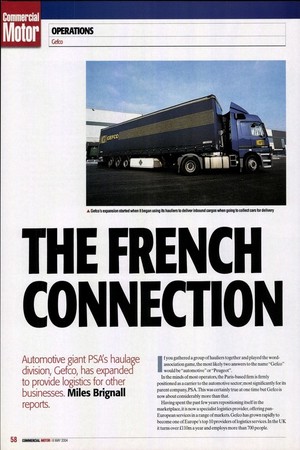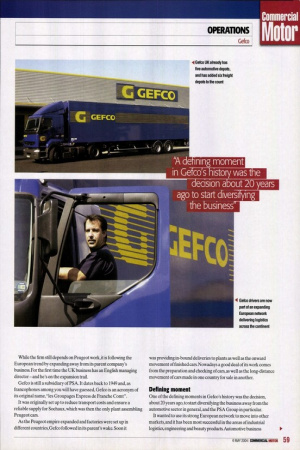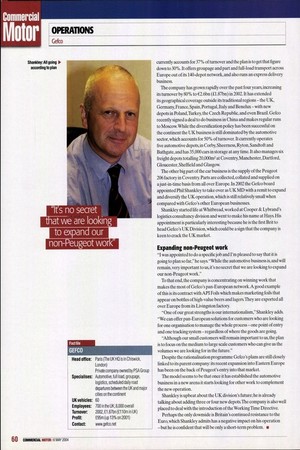THE FRENCH
Page 58

Page 59

Page 60

If you've noticed an error in this article please click here to report it so we can fix it.
CONNECTION
Automotive giant PSAs haulage division, Gefco, has expanded to provide logistics for other businesses. Miles Brignall
reports.
If you gathered a group of hauliers together and played the wordassociation game, the most likely two answers to the name "Gefco" would be "automotive" or "Peugeot".
In the minds of most operators, the Paris-based firm is firmly positioned as a carrier to the automotive sector; most significantly for its parent company,PSA. This was certainly true at one time but Gefco is now about considerably more than that.
Having spent the past few years repositioning itself in the marketplace, it is now a specialist logistics provider, offering panEuropean services in a range of markets. Gefco has grown rapidly to become one of Europe's top 10 providers of logistics services. In the UK it turns over f110m a year and employs more than 700 people.
While the firm still depends on Peugeot work, it is following the European trend by expanding away from its parent company's business. For the first time the UK business has an English managing director — and he's on the expansion trail.
Gefco is still a subsidiary of PSA. It dates back to 1949 and, as francophones among you will have guessed, Gefco is an acronym of its original name,"les Groupages Express de Franche Comt".
It was originally set up to reduce transport costs and ensure a reliable supply for Sochaux, which was then the only plant assembling Peugeot cars. As the Peugeot empire expanded and factories were set up in different countries, Gefco followed in its parent's wake. Soon it
was providing in-bound deliveries to plants as well as the onward movement of finished cars. Nowadays a good deal of its work comes from the preparation and checking of cars, as well as the long-distance movement of cars made in one country for sale in another. Defining moment
One of the defining moments in Gefco's history was the decision, about 20 years ago, to start diversifying the business away from the automotive sector in general, and the PSA Group in particular. It wanted to use its strong European network to move into other markets, and it has been most successful in the areas of industrial logistics, engineering and beauty products.Automotive business
currently accounts for 37% of turnover and the plan is to get that figure down to 30%. It offers groupage and part and full-load transport across Europe out of its 140-depot network, and also runs an express delivery business.
The company has grown rapidly over the past four years, increasing its turnover by 80% to €2.6bn (£1.87bn) in 2002. It has extended its geographical coverage outside its traditional regions — the UK, Germany, France, Spain, Portugal, Italy and Benelux— with new depots in Poland,lbikey, the Czech Republic, and even Brazil. Gefco recently signed a deal to do business in China and makes regular runs to Moscow.While the diversification policy has been successful on the continent the UK business is still dominated by the automotive sector, which accounts for 50% of turnover. It currently operates five automotive depots, in Corby, Sheerness, Ryton, Sandtoft and Bathgate, and has 35,000 cars in storage at any time. It also manages six freight depots totalling 20,000m2 at Coventry, Manchester, Dartford, Gloucester, Sheffield and Glasgow.
The other big part of the car business is the supply of the Peugeot 206 factory in Coventry Parts are collected, collated and supplied on a just-in-time basis from all over Europe. In 2002 the Gefco board appointed Phil Shankley to take over as UK MD with a remit to expand and diversify the UK operation, which is still relatively small when compared with Gefco's other European businesses.
Shankley started life at Whitbread, worked at Cooper & Lybrand's logistics consultancy division and went to make his name at Hays. His appointment is particularly interesting because he is the first Brit to head Gefco's UK Division, which could be a sign that the company is keen to crack the UK market. Expanding non-Peugeot work
"I was appointed to do a specific job and I'm pleased to say that it is going to plan so far," he says."While the automotive business is, and will remain, very important to us, it's no secret that we are looking to expand our non-Peugeot work."
To that end, the company is concentrating on winning work that makes the most of Gefco's pan-European network.A good example of this is its contract with API Foils which makes marketing foils that appear on bottles of high-value beers and lagers. They are exported all over Europe from its Livingston factory.
"One of our great strengths is our internationalism," Shanldey adds. "We can offer pan-European solutions for customers who are looking for one organisation to manage the whole process — one point of entry and one tracking system — regardless of where the goods are going.
"Although our small customers will remain important to us, the plan is to focus on the medium to large scale customers who can give us the volumes we are looking for in the future."
Despite the rationalisation programme Gefco's plans are still closely linked to its parent company: its recent expansion into Eastern Europe has been on the back of Peugeot's entry into that market.
The model seems to be that once it has established the automotive business in a new arena it starts looking for other work to complement the new operation.
Shankley is upbeat about the UK division's future; he is already talking about adding three or four new depots. The company is also well placed to deal with the introduction of the Working Time Directive. Perhaps the only downside is Britain's continued resistance to the Euro, which Shankley admits has a negative impact on his operation — but he is confident that will be only a short-term problem. •


























































































































































































